|
|
|
Sort Order |
|
|
|
Items / Page
|
|
|
|
|
|
|
| Srl | Item |
| 1 |
ID:
092210
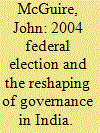

|
|
|
|
|
| Publication |
2009.
|
| Summary/Abstract |
Any assessment of political developments in post-colonial India inevitably begins with the Indian National Congress (INC). Not only is it the oldest political party in India, but it also assumed a seminal role in mobilising and leading the independence movement from the late nineteenth century through to 1947. Since then, it has dominated parliamentary politics until 1996, when it lost government to a coalition of parties, in part as a result of what was identified as deep-seated corruption in the ranks of its parliamentarians. Yet there were other factors that contributed to this decline, the most notable of which was the emergence and rise of the Bharatiya Janata Party (BJP). Indeed, it could be argued that, by the beginning of the twenty-first century, the BJP could be seen as the most significant development in defining the changing nature of Indian politics.
|
|
|
|
|
|
|
|
|
|
|
|
|
|
|
|
| 2 |
ID:
129938
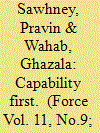

|
|
|
| 3 |
ID:
145491
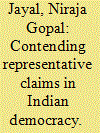

|
|
|
|
|
| Summary/Abstract |
This article essays an interpretation of representative claims articulated in the campaign for the Lok Sabha election of 2014, arguing that this election signals a shift from one dominant type of representative claim to another. The first two claims—the classical liberal view of political representation as an aggregation of preferences and descriptive representation—are embodied by the Congress Party and the social justice parties respectively. These claims are located within the universe of representative democracy, and are sought to be transcended by two new representative claims, encountered in the 2014 election. These are counter-democratic populism and realist Caesarism, signified by the Aam Aadmi Party and the Narendra Modi-led Bharatiya Janata Party, respectively. While these two do not dispense with representative democracy, their claim to provide a more effective or stronger form of democracy indicates a significant departure that redefines the relationship between representation and democracy.
|
|
|
|
|
|
|
|
|
|
|
|
|
|
|
|
| 4 |
ID:
146573
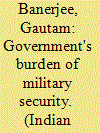

|
|
|
|
|
| Contents |
It needs no revelation that there is widespread consternation within the strategically committed community, the intelligentsia and the media over the growing obsolescence and declining operational capability of the ultimate cutting instrument of national power - the military force structure. Thus in spite of maintaining the third largest military force in the world, there is imposition of only a fractional deterrence upon the perennial adversaries while they keep jabbing hurtfully at rib of the Indian nationhood. The new political leadership is apparently intent on remedying that undesirable situation. Therefore, to turn its rhetoric into action, the NDA government has to acknowledge that there are two distinct aspects to the amelioration of that undesirable stage, and tackled these on priority if its political pronouncements are to gain respectability from the citizenry.
|
|
|
|
|
|
|
|
|
|
|
|
|
|
|
|
| 5 |
ID:
142838
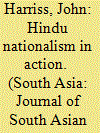

|
|
|
| 6 |
ID:
164039
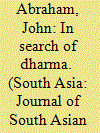

|
|
|
|
|
| Summary/Abstract |
This article examines the roots of a Hindu nationalist economic agenda. Beginning with a critical overview of Deendayal Upadhyaya’s economic manifesto, Integral Humanism (1965), it delineates the eclectic set of ideas drawn together by this early Hindu nationalist leader to formulate an alternative ethical and economic agenda from either centralised planning or its liberal critics. The paper then gauges the influence of Integral Humanism on two successive Hindu nationalist political parties. The analysis shows more discernable influence on the economic position of the Bharatiya Jana Sangh (1951–77) than on its successor, the Bharatiya Janata Party (from 1980). The conclusion offers some observations as to why this is the case, and outlines prospects for the economic future of India under a Hindu nationalist government.
|
|
|
|
|
|
|
|
|
|
|
|
|
|
|
|
| 7 |
ID:
094016
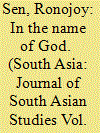

|
|
|
|
|
| Publication |
2010.
|
| Summary/Abstract |
The primary question addressed by this essay is: How are religion and religious propaganda in election campaigns in India regulated? I study this question by looking at the rulings of the Supreme Court, which is the final arbiter in all matters related to electoral disputes. The relevant portion of the Representation of the People Act (RPA)-the legislation governing the conduct of Indian elections passed in 1951-that relates to regulating religion are various provisions of Section 123.1 Section 123(3) deems as 'corrupt practice' election candidates or their agents appealing for votes on the grounds of religion or religious symbols; Section 123(2)(a)(ii) defines as corrupt practice attempts to induce a candidate or voter to believe that he would become an object of 'divine displeasure or spiritual censure'; and Section 123(3A) considers as corrupt practice attempts to promote enmity on grounds of religion, race, community or language. More recently, Section 123(3B) does the same for candidates propagating the practice of sati or glorifying it. In addition, Section 125 of the RPA makes attempts to promote enmity or hatred on the 'grounds of religion, race, caste, community or language' a punishable offence.
|
|
|
|
|
|
|
|
|
|
|
|
|
|
|
|
| 8 |
ID:
121998
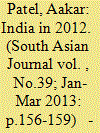

|
|
|
| 9 |
ID:
137899
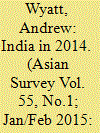

|
|
|
|
|
| Summary/Abstract |
The much anticipated general election produced a majority for the Bharatiya Janata Party under the leadership of Narendra Modi. The new administration is setting out an agenda for governing. The economy showed some signs of improvement, business confidence is returning, but economic growth has yet to return to earlier high levels.
|
|
|
|
|
|
|
|
|
|
|
|
|
|
|
|
| 10 |
ID:
160391
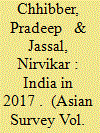

|
|
|
|
|
| Summary/Abstract |
The year 2017 saw the ruling Bharatiya Janata Party extend its electoral dominance by winning major state elections. The BJP was less successful, however, in containing contentious politics and vigilantism by right-wing groups. It was also a tumultuous year for the Indian economy as it strove to recover from the shock of major reforms. The Supreme Court issued landmark verdicts likely to have weighty implications for Indian society in the years to come. The Indian government could also claim credit for foreign policy successes vis-à-vis China, Pakistan, Israel, and the ICJ.
|
|
|
|
|
|
|
|
|
|
|
|
|
|
|
|
| 11 |
ID:
132202
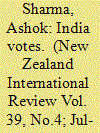

|
|
|
| 12 |
ID:
146899
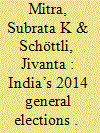

|
|
|
|
|
| Summary/Abstract |
Phrases like “watershed,” “historic,” and “epochal” were used to describe India’s 2014 general election. The Bharatiya Janata Party secured the first single-party majority in three decades, forming the government as the National Democratic Alliance. We argue that the 16th Lok Sabha elections marked a realignment, not a clean break with the past.
|
|
|
|
|
|
|
|
|
|
|
|
|
|
|
|
| 13 |
ID:
139041
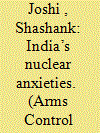

|
|
|
|
|
| Summary/Abstract |
In April 2014, India’s Bharatiya Janata Party (BJP), which would be swept into office the following month, included in its manifesto a tantalizing promise to “revise and update” India’s nuclear doctrine “to make it relevant to challenges of current times.” When pressed, party officials suggested they were specifically interested in tinkering with India’s no-first-use policy.
|
|
|
|
|
|
|
|
|
|
|
|
|
|
|
|
| 14 |
ID:
138954
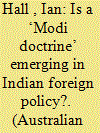

|
|
|
|
|
| Summary/Abstract |
Narendra Modi’s election as India’s prime minister in May 2014 has generated speculation that a new ‘Modi doctrine’ is emerging in Indian foreign policy. This article assesses the evidence for that claim. It argues that a ‘doctrine’ should embody a set of clearly stated principles for foreign policy making. It analyses the main achievements of Modi’s policy in the months after his election. It finds that while Modi has brought new energy to the conduct of foreign policy, his approach is essentially pragmatic, and his objectives are similar to those pursued by his two immediate predecessors— Atal Bihari Vajpayee and Manmohan Singh.
|
|
|
|
|
|
|
|
|
|
|
|
|
|
|
|
| 15 |
ID:
094011
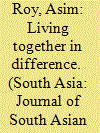

|
|
|
|
|
| Publication |
2010.
|
| Summary/Abstract |
If history is commonly viewed as a useful tool for seeking linkage between the past and present, the politics of colonial and post-colonial India has indeed come to place pre-colonial India at the centre of historical debates in contemporary India. Despite the relative dominance of the secular liberal nationalists in the colonial and the early decades of post-colonial India, the subsequent period saw the steady emergence and rise of the 'extremist' or 'militant' Hindu supremacist ideology of Hindutva-vad, the totalising, homogenising and unhistorical political-cultural construct of the notion of Hindutva (literally, the 'essence' of Hinduism or 'Hindu-ness'). The Hindutva-vadi (literally, the propagation of Hindutva-vad) has come to represent, in practical terms, an intolerant and violent Hindu majoritarian politics. In the name of redressing the alleged 'past wrongs and injustices' perpetrated on the contemporaneous Hindus by their 'medieval' Muslim conquerors, the Hindutva-vadi particularly target the minority Muslim community. The litany of those 'medieval' Muslim 'sins', in the eyes of today's Hindutva-vadi is long, and ranged from alleged discriminatory attitudes and measures, forced conversions, temple desecrations and destructions, construction of mosques at times on those ruined temples, to outright executions and slaughters.
|
|
|
|
|
|
|
|
|
|
|
|
|
|
|
|
| 16 |
ID:
186301
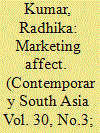

|
|
|
|
|
| Summary/Abstract |
Electoral campaigning in India is now effectively multi-modal and inhabits both the virtual and the real sphere. However, tools and techniques of campaigning vary across parties. The two parties that this paper focuses on, the BJP and the AAP, are known for running highly organized campaigns marked by their intensity and voter reach. The paper looks at the specific case of the Delhi assembly elections of 2015 and 2020 to compare strategies and the election campaign of the two parties. The paper argues that while the campaign of both parties was methodical and micro-managed, the selection of electoral issues and customization of the campaign to the addressed audience varied. The parties are comparable in terms of being leader centric, tending towards the personalization of politics, and both conducted professionalized campaigns, yet the political marketing of the element of affect differed. To demonstrate this, the paper firstly draws on literature in the field of political communication to illustrate the role of emotions, or the aspect of affect, in an electoral campaign. Secondly, through a perusal of media reportage and analysis, the paper traces the process by which personalization was manifested and how the narrative of affect came to be framed in the election campaign.
|
|
|
|
|
|
|
|
|
|
|
|
|
|
|
|
| 17 |
ID:
138559
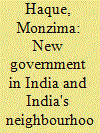

|
|
|
|
|
| Summary/Abstract |
Maintaining harmony and peace in South Asia has been a crucial intent not only of India but also of its South Asian neighbours. Nevertheless, sustaining stable relationships among New Delhi and its South Asian neighbours have had remained a formidable challenge. Following May 2014 national election, a new government led by the Bharatiya Janata Party (BJP) assumed office in India. The new Prime Minister Narendra Modi, a Hindu nationalist, renowned for his impressive management of Gujarat’s economy as Chief Minister is now the leader of the one billion plus population. New developments, especially inviting all South Asian leaders in Indian Prime Minister’s oath-taking ceremony and choosing South Asian Himalayan countries for opening foreign visits, have stirred up euphoria regarding possibilities of re-energising the flagging discourse of South Asian neighbourhood. Building on these evolving scenarios, this paper looks into India’s South Asian neighbourhood discourse in the context of new government’s accession to power in India. Taking up the early days conducts of the new Prime Minister into consideration, the paper reveals that although the style of the new government to deal with neighbours may reflect changes, the overall objective management of India’s regional relations is unlikely to deviate much.
|
|
|
|
|
|
|
|
|
|
|
|
|
|
|
|
| 18 |
ID:
154627
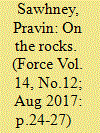

|
|
|
| 19 |
ID:
132433
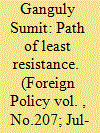

|
|
|
| 20 |
ID:
156362
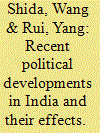

|
|
|
|
|
| Summary/Abstract |
The Bharatiya Janata Party is exhibiting stronger presence as a one-party-rule at both federal and local levels. This increases the likelihood of Modi's re-election as prime minister in 2019. Obviously, Indian political development is characterized by complexity, accidental factors and intrinsic logic, which will definitely exert great influcnece on the future of India.
|
|
|
|
|
|
|
|
|
|
|
|
|
|
|
|
|
|
|
|
|